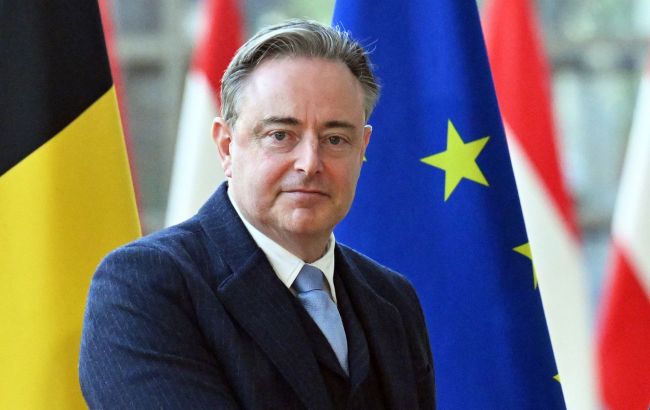"Prevents reaching an eventual peace deal": Belgian PM warns against EU plan on Russian assets
 Photo: Belgian Prime Minister Bart de Wever (Getty Images)
Photo: Belgian Prime Minister Bart de Wever (Getty Images)
Belgian Prime Minister Bart De Wever says that the EU's plan to use Russia's frozen assets to finance Ukraine could have serious economic and geopolitical consequences, according to Euractiv.
According to the outlet, the Belgian prime minister sent a letter to European Commission President Ursula von der Leyen.
De Wever noted that this scheme for using Russia’s frozen assets is "fundamentally wrong" and could put Belgium in a vulnerable position.
In the letter, he wrote that the proposal could harm the reputation of Euroclear, the Brussels-based securities depository that holds Russian assets.
"It would not be just and fair to expect that, while the advantages of such a scheme are for all, the costs and risks would be for Belgium to bear," the prime minister wrote.
The head of the Belgian government said he was surprised by what he called a "complete lack of understanding" among EU leaders of the legal and financial risks.
According to him, the European Commission has not yet presented a draft legal text, and the "options paper" recently shared with EU capitals does not address Belgium’s concerns.
De Wever also said that the plan could prompt investors to sell EU bonds or withdraw funds from Euroclear and other European institutions, "amplifying systemic risks" and potentially destabilizing the euro.
The Belgian prime minister reiterated his conditions: EU countries must immediately and collectively provide liquidity to cover the amount held at Euroclear if sanctions against Moscow are lifted, share the burden of potential legal challenges, and ensure that other Western countries holding Russian assets commit to similar arrangements.
As an alternative, he urged EU states to prioritize unspent funds from the current seven-year budget.
"Hastily moving forward on the proposed reparations loan scheme would have, as collateral damage, that we as EU are effectively preventing reaching an eventual peace deal," De Wever emphasized.
He added that the EU must choose between keeping the assets frozen until the end of the war to support reconstruction, or using them now to finance Ukraine's military efforts — but not both at the same time.
"Reparations loan" for Ukraine
The European Commission has proposed providing Ukraine with a "reparations loan" worth 140 billion euros. It would be backed by Russian assets frozen by the EU after the start of the full-scale invasion of Ukraine.
For Ukraine to receive such a reparations loan, all EU member states must agree.
However, the initiative is being blocked by Belgium — the country that holds the largest share of Russia’s frozen assets.
Meanwhile, European countries are developing a "Plan B" in case they fail to agree on using frozen Russian assets to provide Ukraine with the reparations loan.
According to Politico sources, one option gaining support is a "transitional" loan financed by EU borrowing to support Ukraine in the first months of 2026.
European Commission President Ursula von der Leyen said that the EU will present a legislative proposal in the coming days allowing the use of Russia’s frozen assets to provide Ukraine with a 140 billion euro reparations loan.

